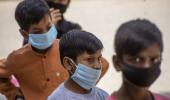Though Covid cases are rising in Delhi and its satellite towns, the focus should be on hospital admissions that have remained the same or changed just marginally, say several scientists, underscoring that the uptick is not an indication of a fourth wave in the country at this point.

The removal of Covid-19 restrictions, including schools reopening for offline classes, increased socialising and economic activity may be driving the spike in the national capital and its surrounding areas, and some other pockets, they said.
”It has been more than two weeks since all Covid-19 restrictions have been removed. It is a holiday period and people are meeting and intermingling. This is also reflected in social mobility and economic activity, which are higher than pre-pandemic periods,” physician-epidemiologist Chandrakant Lahariya told PTI while also advising caution and stressing on continued surveillance.
"Merely counting cases has no meaning... though cases are rising in Delhi, hospital admission remains unchanged or marginally changed," he said.
Given the epidemiological and scientific evidence, the current rise in cases in Delhi is not the start of the fourth wave.
"SARS CoV-2 is going to stay with us for a long time and therefore, there is not going to be any period when the new cases would be zero,” he said.
Delhi's Covid-19 positivity rate on Monday jumped to 7.72 per cent with 501 fresh cases, according to health department data. The last time the positivity rate was above seven per cent in the city was on January 29 (7.4 per cent) and on January 28 (8.6 per cent), officials said.
This is in sharp contrast to India's overall positivity rate of 0.31 per cent recorded by the Union health ministry on Tuesday when 1,247 coronavirus infections were reported.
While scientists don't have exact answers why, US-based Infectious disease expert Amita Gupta noted that the rise in cases in Delhi and some other states may be a result of looser restrictions, pandemic fatigue, and higher transmissibility of the virus.
”We anticipate this will not result in a major increase in severe cases requiring hospitalisation as this is not what we are seeing elsewhere despite the increased transmissibility,” Gupta, chief of the division of infectious disease and professor of medicine at Johns Hopkins School of Medicine, told PTI.
”It really helps that India has done an incredible job in vaccinating its population and now it is important to continue to do this and to administer the booster shots to those who are eligible,” she added.
Modeller Manindra Agrawal, who has been tracking India's Covid-19 trajectory since the beginning of the pandemic, concurred.
”Increase in social mobility, lowering of guard and removal of mask mandates are the possible reasons behind the increase in Covid cases,” Agrawal, a professor at the Indian Institute of Technology (IIT) Kanpur, told PTI.
”There is also no indication of a fourth wave for now. For that to happen, a new mutant will have to arise,” Agrawal added.
As testing rates have dropped, it is not known if the cases being reported are a true indication of the situation, epidemiologist Ramanan Laxminarayan said.
”Testing has gone down and we are likely missing cases but I would focus on hospitalisations rather than caseloads given where we are in the pandemic,” Laxminarayan, director of the Center for Disease Dynamics, Economics & Policy in Washington and New Delhi, told PTI.
There is a global resurgence in cases and we should expect to see greater synchronicity in Covid cases globally given that travel barriers between countries have dropped.
”The BA.2 subvariant of Omicron appears to be more able to evade immunity to cause infections but is also less lethal possibly because of existing immunity from prior infection and vaccination,” he said.
Scientists also cautioned against complacency.
Lahariya, for instance, said the world is still not over the pandemic and it is hard to predict when new variants will emerge and how they will behave.
”We should continue close surveillance for early detection of Covid cases through existing surveillance networks in the country and be prepared to trigger recommendations to resume masking, social distancing if and when surges occur,” he added.
The use of masks by people in Delhi has considerably reduced after a fine of Rs 500 was withdrawn by the officials earlier this month. Experts are divided over whether this was ideal in view of the rising number of infections.
Agrawal noted that bringing back mask mandates would be a good step, but the data right now is insufficient to make any predictions about the future trajectory of the Covid-19 pandemic in the country.
As with any respiratory virus and illness, Lahariya added, we can always expect some spike on regular intervals.
”The BA.2 and XE sublineages are now global and we are likely to see greater global convergence in Covid patterns since transmission will be easier between countries,” Laxminarayan explained.
In recent weeks there has been a rise in Covid cases in many countries, including the US, driven by the BA.2 subvariant of coronavirus, but the hospitalisation rate has been low.
According to Lahariya, a comparison with any other country or making inferences from the global trend is not logical.
”What is happening in any other country has no implication for India and carries no learning. The focus has to be using the local evidence for decision making. Every country's context is different. BA.2 or XE which is a recombinant of BA.1 and BA.2 sub lineage is unlikely to cause major increase in cases in India.”
”BA.2 was responsible for the recent Omicron surge in India in January-February 2022. Scientifically, we know that the same variant (and XE is just a sub-type) cannot cause a fresh wave at least for six to nine months. The caveat is that Yes, if a new variant which is more transmissible than Omicron and has immune escape, then only there is risk of a fresh wave,” he added.
Besides Delhi, other places have also seen their Covid graph rise. On April 18, Kerala reported a five day rise of 940 new cases.
The number of Covid positive cases in Haryana rose from 514 between April 5-11 to 1,119 between April 12-18, with the highest number of cases being reported from Gurugram and Faridabad, both towns adjacent to Delhi.
Noida and Ghaziabad in Uttar Pradesh witnessed an increase in the number of infections, from around 45 daily cases across the state at the beginning of the month to 135 cases on Monday.











 © 2025
© 2025